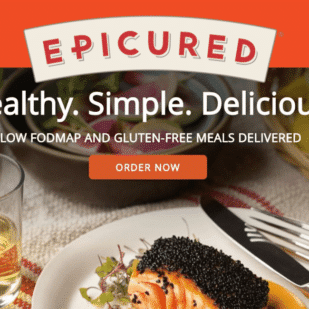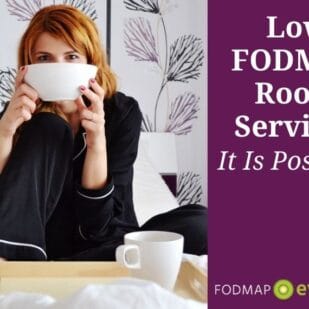Epicured Is The First Low FODMAP Meal Delivery Service In The U.S.
Epicured is the first meal delivery service in the United States offering low FODMAP and gluten-free meals and snacks, aiding patients in managing digestive diseases, such as irritable bowel syndrome, Crohn’s disease, colitis, celiac disease and non-celiac gluten sensitivity.
FODMAP Everyday® is partnering with Epicured to create educational resources and tools that will enhance your experience of the low FODMAP diet.
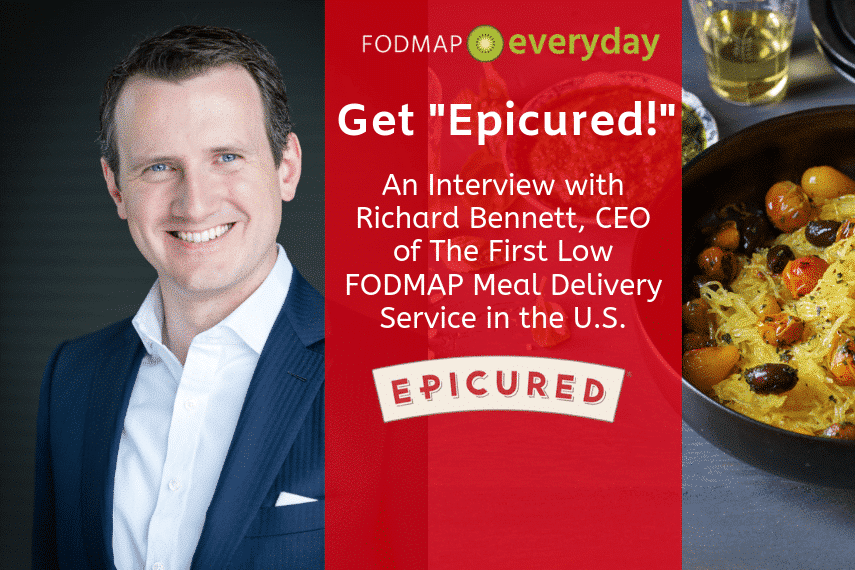
For additional general information about Epicured, please see our article, Epicured: Low FODMAP Meals Delivered To Your Door.
We have had the good fortune to spend time with co-founders CEO Richard Bennett and Renee Cherkezian RN as well as with Jaime Haak, Vice President Sales and Marketing at their NYC Soho headquarters.
Richard chatted with us about how Epicured came to be, their significant relationship with Mount Sinai and plans for the future.
Dédé Wilson: First of all, Robin and I just want to say how excited we are about working together to bring helpful recipes, videos and educational tools to both of our interrelated communities. We would love to have you tell our community, in your own words, how the idea for Epicured came about.
Richard Bennett: First off, Dédé and Robin, I’m so excited to be partnering with both of you and FODMAP Everyday®. It was so great to host you for our first FOD-Night Out!
Renee and I believe in the natural healing power of food. Healthcare doesn’t pay enough attention to how food impacts your health. We believe in moving away from pills and procedures as the intervention, and towards a gut-friendly diet.
Food is the most impactful health choice you can make on a daily basis and we started Epicured with the goal to make it an enjoyable experience, even though you’re on a restrictive diet.
At which point did a relationship with Mount Sinai begin? What is the origin story of that partnership?
Richard: Our healthcare startup launched in the Summer of 2016 and fortunately, our journey caught the attention of the managing director at Mount Sinai Ventures, Brent Stackhouse. In the Fall of 2016, he approached us and has since become one of our biggest advocates!
Through this relationship, one of their dietitians from the GI department, Laura Manning, discovered us and was excited to learn about our therapeutic menu. Soon after, our clinical validation began with their GI department and Laura became a natural clinical sponsor. It was an exciting time for us and word spread quickly to Bruce Sands, the chair of GI and Barbara Murphy, the chair of the Department of Medicine.
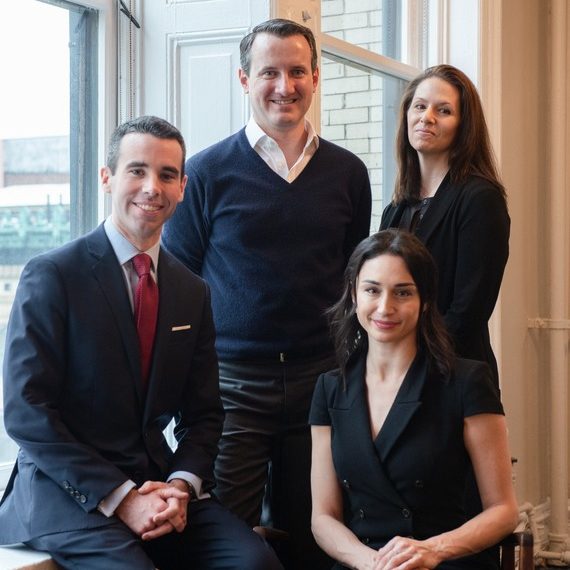
We led a successful pilot program that satisfied their efficacy, along with rigor, taste and service for patients – it resulted in Mount Sinai rolling the program out within their clinical protocol. In 2017, Stackhouse invested with Mount Sinai Ventures in support of our mission – this was the first of three investments.
We’re also apart of their employee wellness program, which is focused on building employee wellness, led by their Chief Human Resources Officer Jane Maksoud. We’re very happy and honoured to have a strong relationship with their team and excited for future initiatives together.
We just want to mention that you do not need to have a Mount Sinai relationship to order from Epicured. Anyone within your delivery area can order. Tell us about how the ordering process works and what your current available areas are – and be sure to explain your free shipping options and your refer-a-friend program.
Richard: I love this question, it always reminds me of how far we’ve come! Right now, we deliver between Boston and Washington DC, and everywhere in between – this includes Baltimore, all over Boston, Hartford, Long Island, Philadelphia, Providence, Schenectady, and more.
We offer a weekly delivery service on epicured.com and once you log onto the website, you can build-your-own subscription. Food is very personal and we felt our customers would appreciate the freedom to choose how they eat with us. People can use us for ready-to-eat snacks to supplement the low FODMAP routine they’re on with their dietitian, or eat with us 21 meals a week!
Flexibility is a key priority to our customers and we designed the ordering process with this in mind.
We offer delivery one to three times a week, depending on the amount of food that you’re going to be ordering. Customers ordering over $100 don’t pay for delivery. Meals are priced al a carte and an average entree is around $11.50, though we have snacks and beverages from $2 to $8.
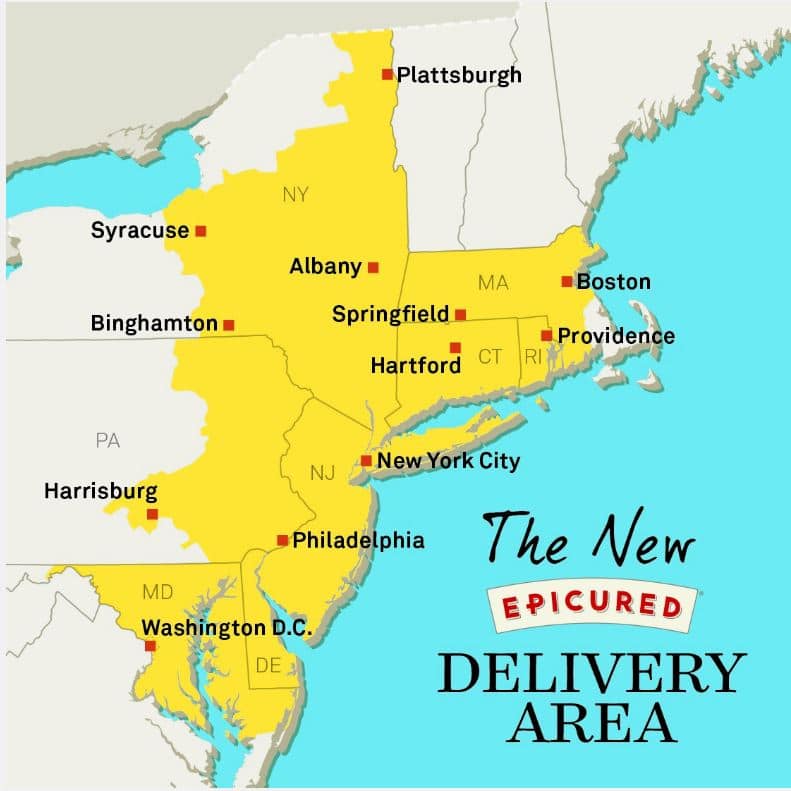
I’m glad you mentioned our refer-a-friend program, it’s starting to take off! The low FODMAP community is tight-knit, and we’ve received a lot of “word of mouth” referrals from them. It’s great to see this traction and we love offering extra discounts to our most supportive customers.
You’ve grown so quickly! It’s clear that you are meeting an unmet need. Can you tell us about your expansion plan? I am sure people reading this in the middle of the U.S. and on the west coast want to know when they can enjoy your food.
Richard: Thank you! We’re eager for people across the country to enjoy our gut-friendly meals. [bctt tweet=”Your diet can change your life and we want impactful, healthy choices to be easy for people to make on a daily basis. – Epicured” username=”FODMAPeveryday”]Our plan is to expand up and down the entire east coast from Portland to Miami to Atlanta, Chicago, Nashville; and make the jump out west to Los Angeles, San Francisco, and Seattle.
We do have national and global plans, however mindful with our approach to growth. Sustaining our relationships with each new customer and clinician is key to our success. It will remain a core part of our business to maintain the same quality of service with all new and existing members in our community.
Robin and I had such a great time at your FOD-Night Out event where you invited your customers and the low FODMAP community to your loft offices and Test Kitchen in NYC for an evening of delicious low FODMAP food and drink – all developed and made by one of your talented chefs. There is no feeling of deprivation or that you are on a restrictive diet in that environment! We love that message – it’s the same one we are sharing with our readers.
Tell us about your chefs. I would love to know how you sold your chefs on an approach that initially appears so restrictive. How was the learning curve for them? How did you help them learn about the low FODMAP diet?
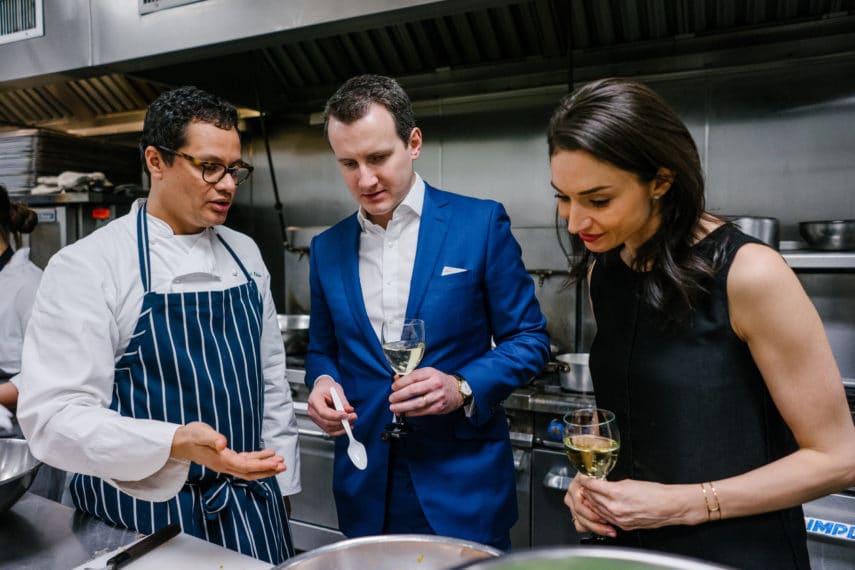
Richard: It all began with my co-founder Renee, she’s a nurse-turned-chef and epitomizes our brand. She trained at David Burke’s kitchen, upon her return from attending Sorbonne and training at École Ritz Escoffier in Paris. Renee’s experience brings unique expertise from two worlds: culinary and clinical.
When we started the company, we were in search for exactly what you described: chefs who like to sit at the intersection of the culinary and the clinical world, understand the power of ingredients, and details around the impact these ingredients have on the human body.
Through personal experiences, Renee was aware of how digestive health impacted the lives of her friends, family and patients. Realizing there was a lack of low FODMAP-friendly meals, she took control and experimented with therapeutic recipes.
In saying this, it was a blessing to be introduced to Chef Daniel Chavez-Bello very early on. He collaborated in the kitchen with Renee a few years ago and loves the chemistry of food to improve digestive health. He previously consulted and designed our entire 100% low FODMAP menu in the beginning and is now, our culinary director. Daniel was most recently the Executive R&D Chef at Bouley, and trained at El Bulli in Spain. He has worked around the globe in Japan, Germany, and France and lectures on nutrition, and food science here in New York at Hunter and Columbia.
His mission and passion is to heal and restore health through food that can be applied to many different formats. From Michelin-starred fine-dining to intimate and delicious events like FOD-Night Out. Now, he’s delivering food to people’s homes and offices through epicured.com.
We would love to hear about your meal creation process. How do you decide what dishes to make and how are they determined to be low FODMAP? Are all of the food items suitable for the Elimination Phase?
Richard: Everything on our menu is 100% safe for the Elimination Phase of the low FODMAP diet and we source seasonal ingredients to keep that commitment to our customers year-round. We want to be a tool for patients and their dietitians and doctors. As you navigate after diagnosis, you’re learning that this is a whole new lifestyle and you’re trying to find your triggers and your safe foods. We wanted to provide that safe baseline for our customers. And by safe, we made it delicious so people don’t even realise they’re on a restrictive diet during the “dreaded elimination phase”.
To stay compliant and ahead of the curve, we are in regular contact on a monthly basis with Monash University, reviewing all their new research and changes. We have a medical advisory board to navigate and steer the product both to make sure that the products are balanced and nutritious, which can be very trying for our customers to do on their own. It’s essential for us to make sure that we stay aligned with the current research as it evolves, which it does on a weekly and monthly basis.
Is there any plan to offer foods that are suitable for post Challenge Phase, such as a food rich in polyols if the customer knows they have a good tolerance to polyols?
Richard: We designed a mindful menu and believe our therapeutic food is a wonderful way for people to eat better, feel better and live better. Our goal is for patients not to realize that they’re on the elimination phase at all and don’t have specific plans to introduce dishes high in one particular FODMAP.
Working with a clinician, patients can supplement and make sure to find their triggers. As mentioned earlier, flexibility is important to our customers and we continue to look for ways to make impactful, healthy choices easy. [bctt tweet=”We want to encourage patients to integrate Epicured into their lifestyle and choose what works for their diet.” username=”FODMAPeveryday”]
This takes me to Living Plate, we partnered with Jeanne Petrucci and she’s created a great meal planning tool that allows you to integrate Epicured into your day-to-day life. It means you can eat Epicured along with other products that you might buy from a farmer’s market, local grocery store or at a local restaurant that you love dining at and you know, they can navigate with you. For us, it’s about building a strong community and finding the right partners in health to bring joy to those eating a restrictive diet.
Also, why was the decision made to create every dish as gluten-free as well as low FODMAP?
Richard: It was a conscious decision on our part. As you know, while you’re on the low FODMAP diet during the elimination phase, it’s largely gluten-free. Our team was also enthusiastic to support our celiac and non-celiac gluten-sensitive patients as well.
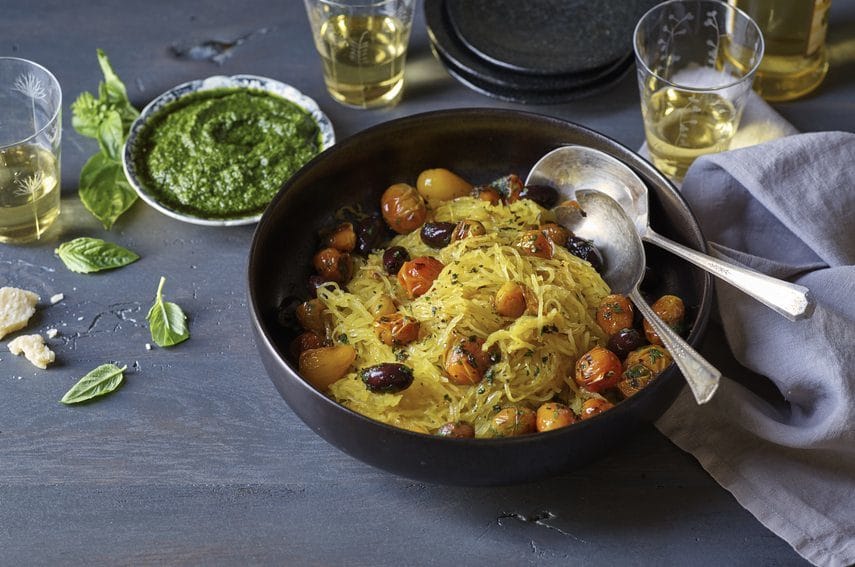
Was the initial focus on patients with IBS and did you expand later to include those with IBD, or was the broader focus from the get-go?
Richard: We were focused broadly on relevant digestive illnesses from the get-go, but we knew that the low FODMAP research was more robust for IBS and that drove our initial inspiration. We were also motivated to be gluten-free for celiac patients.
It was really our collaboration with the Mount Sinai IBD Center that inspired us to be more focused about IBD. We worked with them to study the research and navigate the best practices around food and IBD. Thanks to Laura Manning in particular, their clinical dietitian, we began feeling much more comfortable and confident that we were doing the right thing, facilitating a low FODMAP diet for patients with IBD. Therefore we became a little bit louder and prouder about it. We worked with Laura on a co-branded “Extra-Sensitive Menu” for example.
We continue to look for ways to partner with the Crohn’s and Colitis Foundation and other IBD centers and specialists across the country to help their patients enjoy food and heal through food again. And what we’re very excited about is the partner and further clinical research around the natural healing power of food, whether that be for IBD or for other conditions going forward.
What is the biggest challenge for Epicured when it comes to explaining the diet to potential customers?
Richard: Awareness of the diet is the first hurdle. “Do you know what a low FODMAP diet is?” If you do, you’ve probably been told about how impactful it can be. For those customers, there’s much less for us to communicate. This is one of the many reasons we love working with clinicians to position Epicured as an extension of their treatment plans. It’s ideal when a clinician communicates the power of low FODMAP and positions Epicured as a great way to do it.
We certainly have other customers who discover Epicured and low FODMAP at the same time. For people who are new to the diet, we will give them materials to explain it easily, “digestion-friendly” and “low bloat” to help people understand the impact and connect it to their lifestyle.
The goal of our gut-friendly is menu is not about attracting everybody. We’re trying to work with the clinical community to find patients that need food to improve their digestive health and can support their busy lifestyles. That’s why we built Epicured. It was important to make our food taste good, be healthy, clean and convenient for people who are inquiring about the low FODMAP diet. In no way do we go about prescribing low FODMAP for the world, that is left to clinicians and for clinicians to prescribe it to the people who need it.
We know you are huge supporters of the clinician community – and that RDNs in particular can find resources through their relationship with Epicured. Can you speak to what those are and what your vision for that?
Richard: We’re healthcare people and in particular, big fans of registered dietitians! In my opinion, they’ve had an under-recognized role both amongst other clinicians, healthcare leaders and the community. We believe they are the future of healthcare and we’re excited to be advocates in promoting their role in our healthcare delivery system.
To further this, it comes down to being their partners on a variety of levels. Some dietitians are focused on social media and looking to build their practice on Instagram, Facebook and/or Twitter. What we’ll do when working with them is happily introduce our customers to their expertise and help grow their community. Others are interested in menu development and have an inner chef in them. We allow them to unleash that inner chef in our R&D test kitchen where they can create video content or collaborate with our culinary team.
Lastly, we are very excited to begin advancing research with our network of RDs. We love to partner with the ones who have the hypotheses and are looking to use food medicine in new ways; who can help us enhance our supply chain and production capability to develop delicious food that will deliver the optimal outcome.
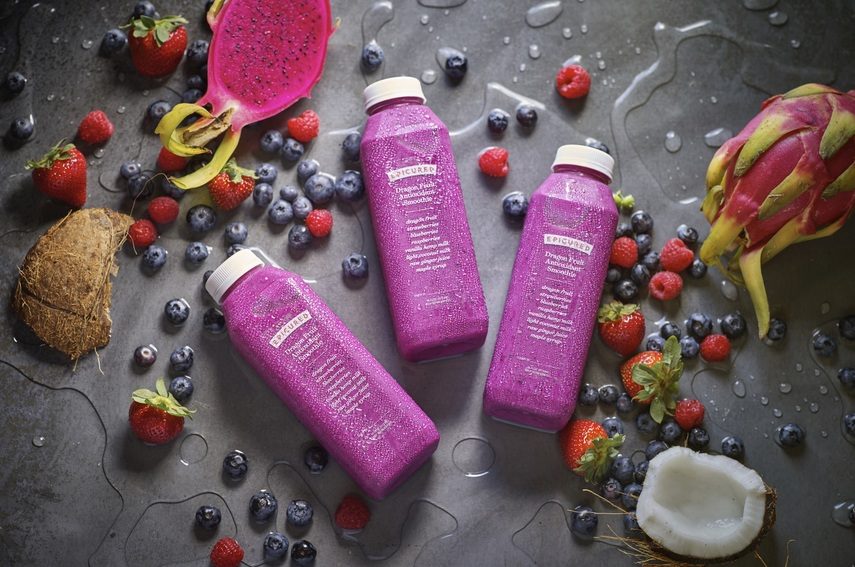
Can you let us in on any exciting plans coming up in 2019?
Richard: Recently, we launched our wholesale business line, and it was a great milestone for us! To date, we’ve been selected by both AmazonGo and Jet.com, which is a division of Walmart.
To give you more context, Amazon Go opened their first store in New York City on May 6th (2019) in Brookfield Place in lower Manhattan. Their Just Walk-Out Shopping experience removes the need to line-up and allows customers to grab products off the shelf and walk out. It’s a very fun and convenient experience.
With our partnership with Jet.com, we have been integrated into their “city grocer program” where you can go to Jet.com, add Epicured products into your shopping cart with the rest of your groceries and have it delivered to your home.
All of this means easier access to our product. When you think about it, “access” has always been one of the biggest problems in healthcare. For Epicured, as a healthcare company creating therapeutic foods, having relationships with incredible partners like Amazon Go and Jet allows us to meet our customers where they already are, and provide more ways for people to take control of their diet and make impactful, healthy choices to improve their health goals.
Richard, thank you so much for this in-depth interview. You began by saying how important you and Renee believe food to be in building and maintaining health and we couldn’t agree more.
And of course, we are aligned in believing that low FODMAP food can be satisfying and never has to feel like deprivation. Together we are working hard on helping those with IBS have delicious lives. We can’t wait to work with you on your future endeavors.
Read more about our partnership in this article, here.
You might also be interested in our article about an evening that Epicured organized – Gut Health: FODMAPs & Beyond.

